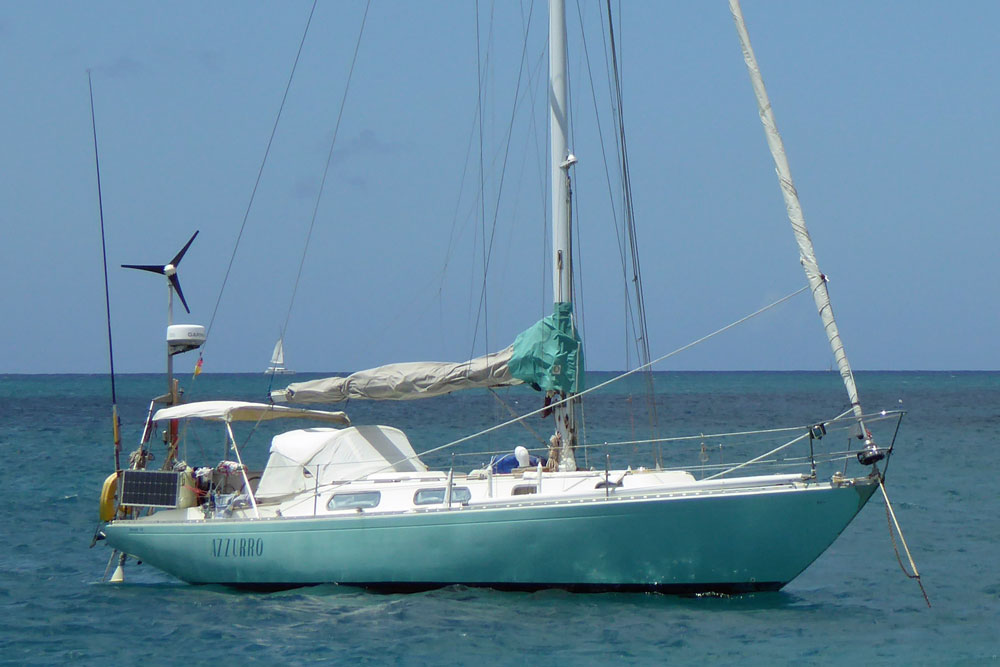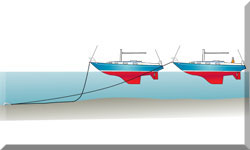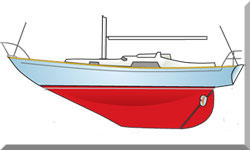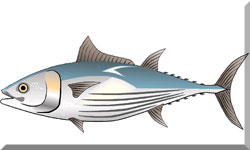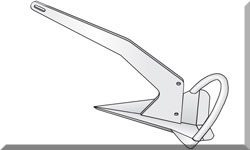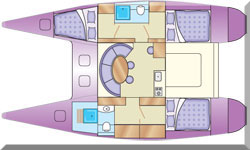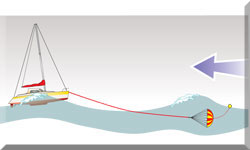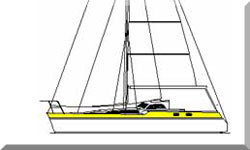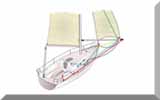- Home
- Cruising Yachts 35' to 40'
- Ohlson 38
The Ohlson 38 Sailboat
The Ohlson 38, an aft-cockpit masthead sloop, was designed by Einar Ohlson and built in the UK by the Tyler Boat Company Ltd.
Published Specification for the Ohlson 38
Underwater Profile: Encapsulated fin keel with skeg-hung rudder.
Hull Material: GRP (Fiberglass)
Length Overall: 37'1" (11.3m)
Waterline Length: 27'6" (8.4m)
Beam: 10'1" (3.1m)
Draft: 5'7" (1.7m)
Rig Type: Masthead sloop
Displacement: 14,900lb (6,759kg)
Designer: Einar Ohlson
Builder: Tyler Boat Co. Ltd. (UK)
Year First Built: 1969
Year Last Built: 1980
Number Built: 129
Published Design Ratios for the Ohlson 38
Sail Area/Displacement Ratio: 15.5
Ballast/Displacement Ratio: 40.3
Displacement/Length Ratio: 317
Comfort Ratio: 35.0
Capsize Screening Formula: 1.6
read more about these all-revealing numbers...
Summary Analysis of the Design Ratios for the Ohlson 38
1. A Sail Area/Displacement Ratio of 15.5 suggests that the Ohlson 38 will need a stiff breeze to get her going. In light conditions, unless you've got plenty of time on your hands, motor-sailing may be the way to go.
2. A Ballast/Displacement Ratio of 40.3 means that the Ohlson 38 will stand up well to her canvas in a blow, helping her to power through the waves.
3. A Displacement/Length Ratio of 317, tells us the Ohlson 38 is clearly a heavy displacement cruising boat. You can load her down with all your cruising gear and equipment and it will hardly affect her waterline. Not an ideal choice for coastal sailing, but she'll come into her own on an offshore passage in testing conditions.
4. Ted Brewer's Comfort Ratio of 35.0 suggests that crew comfort of an Ohlson 38 in a seaway is similar to what you would associate with the motion of a moderate bluewater cruising boat - a predictable and acceptable motion for most seasoned sailors.
5. The Capsize Screening Formula (CSF) of 1.6 tells us that an Ohlson 38 would be a considerately safer choice of sailboat for an ocean passage than one with a CSF of more than 2.0.
Ohlson 38 Sailboat: A Classic Cruiser-Racer
The Ohlson 38 is 38-foot (12 m) cruiser-racer designed by Swedish naval architect Einar Ohlson in 1967, and has proven its capabilities in many races and voyages around the world.
Overview
The Ohlson 38 is a classic design that has a timeless appeal. It has a sleek and elegant profile, with a long overhang at the bow and stern, a low freeboard, and a moderate beam. The hull is made of fiberglass reinforced plastic (GRP), which was a new technology at the time of its creation. The deck and coachroof are also made of GRP, and are bonded to the hull with an inward flange. The Ohlson 38 has a displacement of about 7.5 tons, and a ballast of about 3 tons.
The Ohlson 38 was originally designed as a racer, but it also offers ample space and comfort for cruising. It can accommodate up to six people in three separate cabins, plus a spacious saloon, a galley, a head, and a navigation station. The Ohlson 38 is well-equipped for offshore sailing, with a large fuel tank, a freshwater tank, and ample storage space. It also has a reliable engine, usually a Volvo Penta diesel with about 30 hp.
The Ohlson 38 is known for its speed and performance, especially in light to moderate winds. It has a sail area of about 700 sq ft (65 sq m), and can reach speeds of up to 8 knots. It has a balanced helm, and handles well in various conditions. It is also seaworthy and stable, thanks to its deep fin keel and skeg-hung rudder. The Ohlson 38 has won many races and awards, such as the Observer Single-handed Trans-Atlantic Race in 1976, the Round Britain Race in 1978, and the Yachting Monthly Trophy in 1980.
Accommodation
The Ohlson 38 has a traditional layout that offers comfort and convenience for cruising. The interior is finished in teak woodwork, which gives it a warm and cozy feel. The headroom is about 6 ft (1.8 m) throughout.
The accommodation consists of three separate cabins: a forward cabin with a V-berth, a main cabin with two settees that can convert into berths, and an aft cabin with two quarter berths. The forward cabin also has a hanging locker and storage space under the berth. The main cabin has a folding table that can seat six people comfortably, as well as shelves and lockers for storage. The aft cabin has access to the engine compartment and the cockpit locker.
The galley is located on the port side of the main cabin, near the companionway. It has a two-burner stove with oven, a sink with pressurized water, an icebox or refrigerator, and plenty of counter space and storage cabinets. The navigation station is located on the starboard side of the main cabin, opposite the galley. It has a large chart table with drawers, an instrument panel, and a seat.
The head is located on the port side of the forward cabin, next to the hanging locker. It has a marine toilet, a sink with pressurized water, a shower head with drain pump,
and storage space.
Hull and Deck
The hull of the Ohlson 38 is made of GRP using hand-laid fiberglass matting and woven roving with polyester resin. The hull is stiffened by longitudinal stringers and transverse frames that are bonded to the hull with fiberglass tape. The hull is also reinforced by plywood bulkheads that are tabbed to the hull with fiberglass tape.
The deck of the Ohlson 38 is also made of GRP using hand-laid fiberglass matting and woven roving with polyester resin. The deck is bonded to the hull with an inward flange that forms an integral part of the hull-deck joint. The deck is also stiffened by plywood core sandwiched between two fiberglass layers. The deck has a molded nonskid surface, and is fitted with stainless steel stanchions, lifelines, cleats, and handrails.
The cockpit of the Ohlson 38 is spacious and comfortable, with a single wheel steering system that is connected to the rudder by a cable and quadrant. The cockpit has two large lockers on each side, providing storage space for sails, lines, fenders, and other gear. The cockpit also has a bridge deck that separates it from the companionway, and a lazarette that provides access to the rudder post and the emergency tiller.
The Ohlson 38 has a low-profile coachroof that extends from the mast to the companionway. The coachroof has four fixed windows on each side, and two opening hatches on the top. The coachroof also has handrails on both sides, and a dorade vent on the forward end.
Mast and Rigging
The Ohlson 38 has a masthead sloop rig, with a single aluminum mast that is keel-stepped. The mast has two sets of spreaders, and is supported by stainless steel wire standing rigging that includes a forestay, a backstay, two upper shrouds, two lower shrouds, and two intermediate shrouds. The mast also has an internal conduit for wiring and halyards.
The Ohlson 38 has a boom that is attached to the mast by a gooseneck fitting. The boom has an internal outhaul and reefing system, and is controlled by a topping lift and a boom vang. The boom also has sheet blocks and cleats for the mainsail.
The Ohlson 38 has a roller furling system for the headsail, which is usually a genoa or a jib. The headsail is attached to the forestay by a luff tape, and is controlled by two sheet winches and tracks on the side decks. The headsail also has a UV protection strip on the leech and foot.
The Ohlson 38 can also carry other sails, such as a spinnaker or a staysail. The spinnaker is flown from a spinnaker pole that is stored on the mast or on deck brackets. The spinnaker is controlled by two spinnaker winches and blocks on the cockpit coaming. The staysail is flown from an inner forestay that is attached to the mast below the first spreaders. The staysail is controlled by two sheet winches and tracks on the coachroof.
Keel and Rudder
The Ohlson 38 has a fin keel that is made of cast iron with lead ballast. The keel is bolted to the hull with stainless steel bolts that are embedded in the fiberglass laminate. The keel has a hydrodynamic shape that reduces drag and improves performance.
The Ohlson 38 has a skeg-hung rudder that is made of GRP with foam core. The rudder is attached to the skeg with stainless steel pintles and gudgeons. The rudder has a balanced shape that enhances maneuverability and reduces helm pressure.
Conclusion
The Ohlson 38 yacht is a classic cruiser racer that offers speed, performance, and comfort for recreational sailors. It has a sleek and elegant design, a spacious and cozy interior, a sturdy and reliable construction, and a versatile and efficient rig. It has also proven its capabilities in many races and voyages around the world, making it a popular choice among sailing enthusiasts.
This article was written with the assistance of Gemini, a large language model developed by Google. Gemini was used to gather information, summarize research findings, and provide suggestions for the content and structure of the article.
Recent Articles
-
Is Marine SSB Still Used?
Apr 15, 25 02:05 PM
You'll find the answer to this and other marine SSB-related questions right here... -
Is An SSB Marine Radio Installation Worth Having on Your Sailboat?
Apr 14, 25 02:31 PM
SSB marine radio is expensive to buy and install, but remains the bluewater sailors' favourite means of long-range communication, and here's why -
Correct VHF Radio Procedure: Your Questions Answered
Apr 14, 25 08:37 AM
Got a question about correct VHF radio procedure? Odds are you'll find your answer here...
